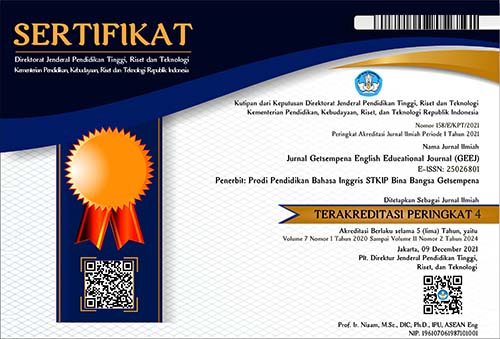LANGUAGE POLITENESS OF STUDENTS AND TEACHERS: AN ETHNOGRAPHIC STUDY
Abstract
This research is based on the discovery of students and teachers at SMAN 01 Logas Tanah Darat, Kuantan Singingi, Riau, who spoke impolitely. As people working in the world of education, students and teachers must certainly pay attention to politeness in language. For this reason, this research needs to be conducted to see the extent of the politeness of students and teachers in communicating in the realm of education. Also, this study not only looked at the politeness of students and teachers but also want to see the factors causing the impoliteness of students and teachers in speaking. This research uses a qualitative approach with ethnographic methods. Sources of data in this study were students and teachers at SMAN 01 Logas Tanah Darat, Kuantan Singingi, Riau. The data in this study are the speech of students and teachers containing six maxim of politeness raised by Leech. The results of this study indicate that students and teachers at SMAN 01 Logas Tanah Darat, Kuantan Singingi Riau can already be categorized politely in speech. This can be seen from the 101 utterances found that only 38 utterances are categorized as impolite or violate the six maxims of the politeness principle stated by Leech.
References
Adriana, I. (2014). Analisis Bahasa SMS Mahasiswa STAIN Pamekasan Terhadap Dosen Menurut Prinsip Kesantunan Leech, 11(1), 53–76.
Brown, P., & Levinson, S. (1987). Politeness: Some Universal In Languange Usage. Camridge: Camridge University Press.
Comes, Joan Borràs. Rafèu Sichel-Bazin, and P. P. (2015). Vocative Intonation Preferences are Sensitive to Politeness Factors., 58(1).
Emzir. (2015). Metodologi Penelitian Pendidikan: Kuantitatif & Kualitatif. Jakarta: Raja Grafindo Persada.
Huang, Y. (2008). Politeness Principle in Cross-Culture Communication, 1(1), 96–101.
Leech, G. N. (1993). Prinsip-prinsip Pragmatik. Jakarta: UI Press.
Mariani, N. (2016). Developing Students ’ Intelligent Character through Linguistic Politeness : The Case of English as a Foreign Language for Indonesian Students, 9(1), 101–106. https://doi.org/10.5539/elt.v9n1p101
Miles and Huberman. (1992). Analisis Data Kualitatif. Jakarta: Universitas Indonesia Press.
Moleong, L. J. (2007). Metodologi Penelitian Kualitatif. Bandung: Remaja Rosda Karya.
Rahardi, R. K. (2017). Linguistic Impoliteness in The Sociopragmatic Perspective, 29(3), 309–315. https://doi.org/10.22146/jh.v29i3.24954
Rahardi, R. K., & Dharma, U. S. (2013). Reinterpretasi ketidaksantunan pragmatik, 25(1), 58–70.
Ristiyani. (2016). Kesantunan tuturan yang digunakan pengasuh dalam pembentukan karakter anak jalanan di rumah singgah, 6(2), 196–209.
Salom, L. & C.-M. in. (2009). Interacting with the Reader: Politeness Strategies in Engineering Research Article Discussions, 175–189.
Wahidah, Y. L. (2017). Analisis Kesantunan Berbahasa Menurut Leech Pada Tuturan Berbahasa Arab Guru Pondok Pesantren Ibnul Qoyyim Putra Yogyakarta Tahun Ajaran 2016 / 2017 ( Kajian Pragmatik ), 2017.
Wardhaugh, R. . (2006). An Introduction to Sociolinguitic. UK: Blackwell.

























